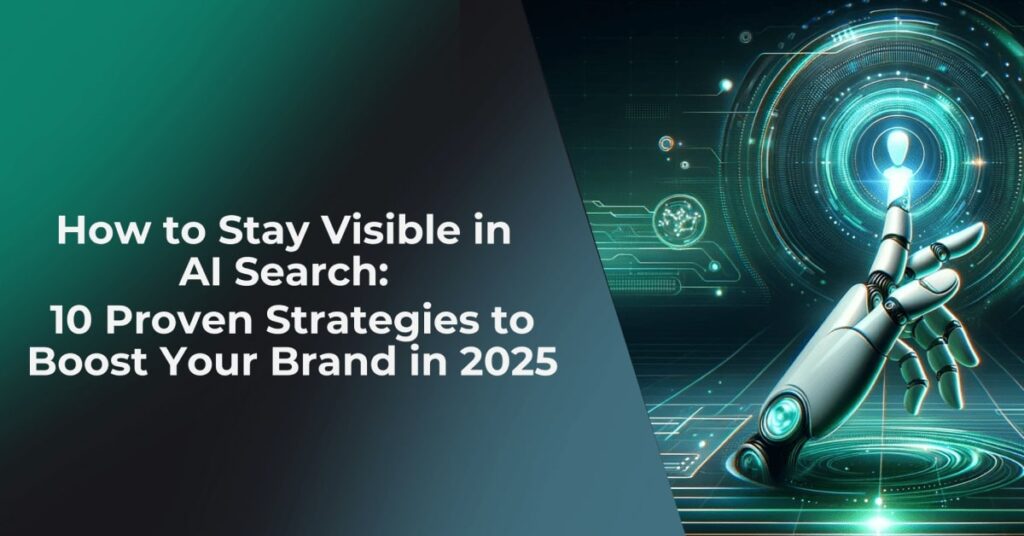AI search is changing the game — and fast.
If traditional SEO was about ranking high in Google’s 10 blue links, AI search is about being the answer an AI assistant provides directly. In other words, if you’re not visible to AI, you’re invisible to your audience.
Let’s break down how to stay visible in AI search with practical, actionable steps.
The Shift from Traditional SEO to AI Search
Just a few years ago, ranking for the right keywords in Google was enough. Now? People are asking ChatGPT, Google Gemini, Perplexity AI, and other assistants for direct answers. If your content isn’t optimized for AI, it might never be mentioned.
Why AI Search Visibility Matters Now More Than Ever
Zero-click searches are rising — users get answers without visiting a site.
AI assistants often cite only a few sources, making visibility a winner-takes-most game.
Early adopters are already dominating AI recommendations.
Understanding How AI Search Works
From Keywords to Context
AI search isn’t just looking for matching words — it’s looking for meaning, intent, and trustworthy answers.
AI Search Models: ChatGPT, Google Gemini, Perplexity, and More
Different models have unique ways of sourcing and summarizing content.
How AI Chooses Which Content to Display
AI tends to favor:
Content with expertise and authority.
Well-structured answers.Reliable, up-to-date information.
10 Proven Strategies to Stay Visible in AI Search
1. Create Authoritative, Expert-Driven Content (E-E-A-T)
Show experience (first-hand case studies, experiments).
Showcase expertise (certifications, professional background).
Build authority with backlinks from credible sources.
Gain trust by being transparent about authorship.
2. Target Conversational and Long-Tail Queries
People talk to AI assistants like humans.
Instead of “best running shoes,” they’ll ask:
“What are the best running shoes for flat feet under $100?”
Answer those directly.
3. Structure Your Content for AI Snippets
AI loves content it can lift and summarize easily.
Use clear headings.
Write short, direct answers at the start of a section.
4. Optimize for Semantic SEO and Topic Clusters
Cover a core topic in-depth.
Link related articles internally.
Help AI see you as an authority in your niche.
5. Leverage FAQs and Q&A Formatting
Add FAQ sections to every relevant page.
Phrase questions the way real people ask them.
6. Build Your Brand Presence Beyond Google
Get mentioned on Reddit, Quora, LinkedIn, and YouTube — AI pulls from multiple platforms.
7. Invest in First-Hand Experience Content
AI tends to favor content that’s unique and experience-based over generic rewrites.
8. Use Structured Data & Schema Markup
Helps AI understand your content’s purpose and relevance.
9. Keep Content Fresh and Up-to-Date
Outdated info gets ignored by AI.
Regularly review and refresh your top articles.
10. Engage on AI-Friendly Platforms and Communities
The more your name pops up in credible contexts, the more likely AI is to recognize it.
Tools and Analytics to Track AI Search Visibility
AI Search Performance Trackers
AlsoAsked.com – Find conversational queries.
Keywords Everywhere – See long-tail variations.
Conversation Monitoring Tools
Mention or Brand24 – Track mentions across the web.
Common Mistakes That Hurt AI Search Visibility
Keyword stuffing instead of answering questions.
Ignoring AI-first search platforms.
Letting evergreen content get stale.
Future Trends in AI Search Optimization
Multi-Modal Search
AI will use text, images, and video together.
Personalized AI Search Results
AI will tailor answers to the user’s history and preferences.
Voice and Conversational AI Growth
Optimizing for spoken queries will be essential.
Conclusion: Thriving in the AI Search Era
AI search is here to stay — and those who adapt early will reap the rewards. By creating trustworthy, conversational, and structured content, you can position yourself as one of the few voices AI assistants trust enough to feature.
Now is the time to make your brand AI-search visible — before your competitors do.
Read More – Windows Server Hardware Requirements (2016-2025): Full Guide
Frequently Asked Questions (FAQs)
1. Is AI search replacing Google SEO?
Not yet — but it’s becoming a major traffic source.
2. How often should I update content for AI visibility?
At least every 6 months for evergreen topics.
3. Do backlinks still matter for AI search?
Yes — they help prove authority.
4. Can AI search pull from social media posts?
Yes, especially on public platforms like Reddit and X (Twitter).
5. Should I create AI-specific content?
Yes — focus on direct, authoritative answers.
6. How do I know if AI is citing my content?
Some tools like Perplexity AI’s source view can show it.

